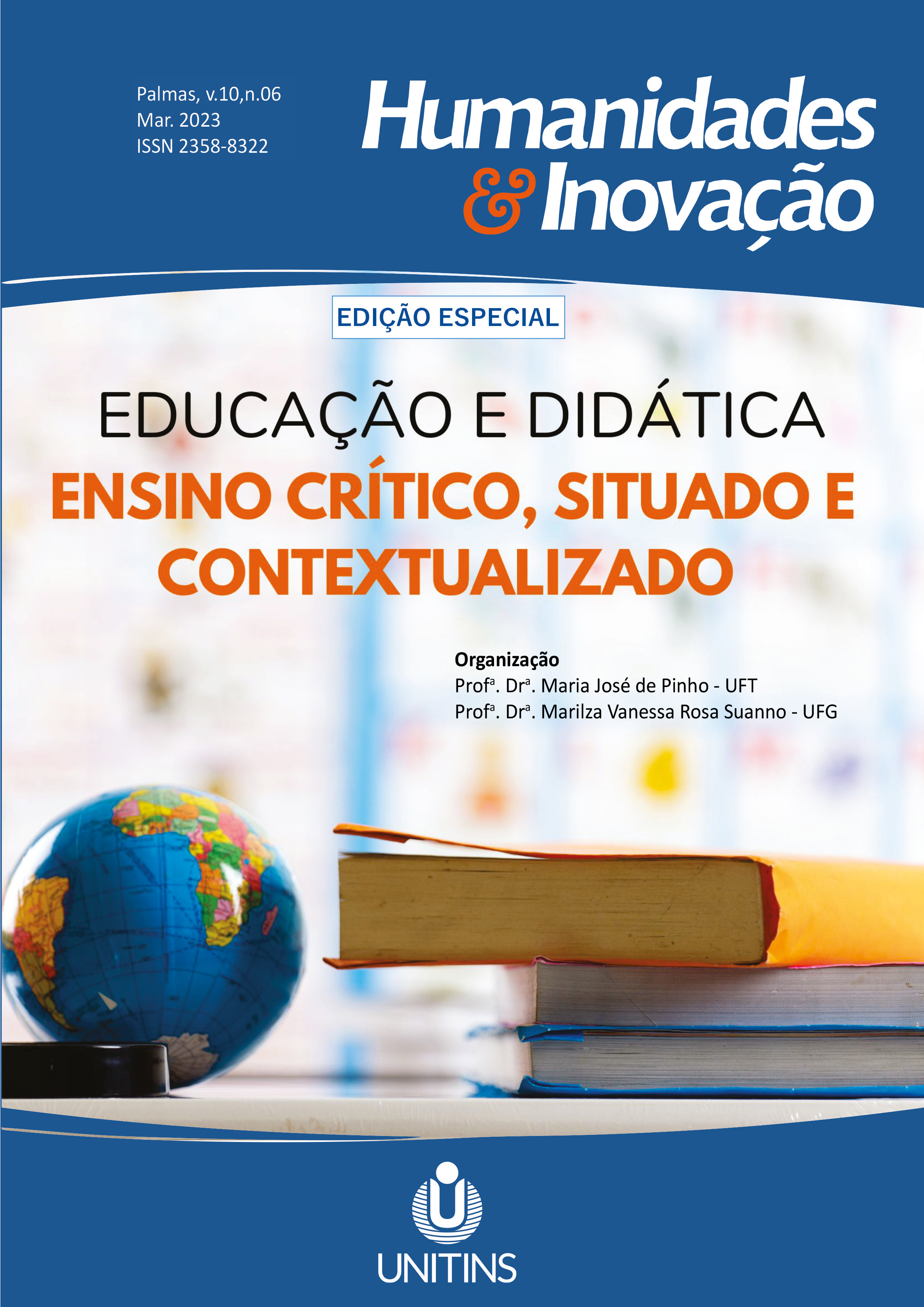ANÁLISIS DE LOS APORTES DE BASE HISTÓRICA DE LAS METODOLOGÍAS ACTIVAS EN LA EDUCACIÓN SUPERIOR
Abstract
El artículo aborda un análisis tanto histórico como cultural del contexto que involucra las metodologías activas en la educación superior, considerando la Escuela Nueva y los principios presentados en las discusiones de John Dewey como un hito histórico, presentando así las perspectivas discutidas a partir de las reflexiones de interacción de sociedad y sus respectivas transformaciones en la educación superior, colocando al estudiante en el centro del proceso de enseñanza y aprendizaje en esta discusión. Este artículo se desarrolló con base en una metodología cualitativa, debido a su carácter dialógico e interpretativo, además, presenta algunas posibilidades para repensar y reorganizar diferentes propuestas didácticas, buscando un cambio en el proceso de enseñanza y aprendizaje.
References
AUSUBEL, David Paul. Education Psychology: a cognitive view. New York: Holt, Rinehart and Winston, 1968.
AUSUBEL, David Paul. The psychology of meaningful verbal learning. New York: Grune & Stratton, 1963.
BACICH, Lilian; MORAN, José. Metodologias ativas para uma educação inovadora: uma abordagem teórico-prática [recurso eletrônico]. Porto Alegre: Penso, 2018.
BERBEL, Neusi Aparecida Navas. As metodologias ativas e a promoção da autonomia de estudantes. Semina: Ciências Sociais e Humanas, vol. 32, no. 1, p. 25–40, 2011. .
BEZANILLA, María José; FERNÁNDEZ-NOGUEIRA, Donna; POBLETE, Manuel; GALINDO-DOMÍNGUEZ, Hector. Methodologies for teaching-learning critical thinking in higher education: The teacher’s view. Thinking Skills and Creativity, vol. 33, p. 100584, Sep. 2019. https://doi.org/10.1016/j.tsc.2019.100584.
CAPRILES, Rene. Makarenko: o nascimento da pedagogia socialista. São Paulo, SP: Scipione, 1989.
DEWEY, John. How we think. [S. l.]: D. C. Heath & Co., 1910.
DEWEY, John. Reconstruction in philosophy. New York: The New American Library, 1950.
DEWEY, John. Vida e educação. 10th ed. São Paulo,SP: Melhoramentos, 1978.
FREIRE, Paulo. Educação como prática de liberdade. São Paulo,SP: Paz e Terra, 1967.
FREIRE, Paulo. Pedagogia da autonomia. São Paulo,SP: Paz e Terra, 2000.
FREIRE, Paulo. Pedagogia do oprimido. Nova York: Herder & Herder, 1970.
GÁMIZ-SÁNCHEZ, Vanesa-María. ICT-based Active Methodologies. Procedia - Social and Behavioral Sciences, vol. 237, p. 606–612, Feb. 2017. https://doi.org/10.1016/j.sbspro.2017.02.018.
HERNÁNDEZ-SAMPIERI, Roberto; TORRES, Christian Paulina Mendoza. Metodología de la investigación: las rutas cuantitativas, cualitativas y mixtas. 7th ed. México: Mc Graw Hill Education, 2018.
MOYA, Emilio Crisol. Using Active Methodologies: The StudentśView. Procedia - Social and Behavioral Sciences, vol. 237, p. 672–677, Feb. 2017. https://doi.org/10.1016/j.sbspro.2017.02.040.
PIAGET, J. Intelligence and affectivity: their relationship during child development. Palo Alto-CA: Annual Reviews, 1954.
ROGERS, Carl Ransom. Liberdade para aprender. [S. l.]: Interlivros, 1971.
RUIZ, A. P. El modelo docente universitario y el uso de nuevas metodologías en la enseñanza, aprendizaje y evaluación. Revista de educación, no. 355, p. 231–232, 2011.
SILVA, Andreza Regina Lopes da; BIEGING, Patricia; BUSARELLO, Raul Inácio. Metodologia ativa na educação. São Paulo: Pimenta Cultural, 2017.
SOUZA, M. T. D.; SILVA, M. D. D.; CARVALHO, R. D. Revisão integrativa: o que é e como fazer. Einstein, vol. 8, p. 102–106, 2010.
TOBÓN, Sergio. Formación integral y competencias: pensamiento complejo, currículo, didáctica y evaluación. 4th ed. Bogotá: Editorial ECOE, 2013.
TOLEDO, J. V.; MOREIRA, U. R.; NUNES, A. K. O uso de metodologias ativas com TIC: uma estratégia colaborativa para o processo de ensino e aprendizagem. Simpósio Internacional de Educação e Comunicação- SIMEDUC, n. 8, 2018.
Copyright Notice
The submission of originals to this periodic implies in transference, by the authors, of the printed and digital copyrights/publishing rights. The copyrights for the published papers belong to the author, and the periodical owns the rights on its first publication. The authors will only be able to use the same results in other publications by a clear indication of this periodical as the one of its original publication. Due to our open access policy, it is allowed the free use of papers in the educational, scientific and non-commercial application, since the source is quoted (please, check the Creative Commons License on the footer area of this page).











